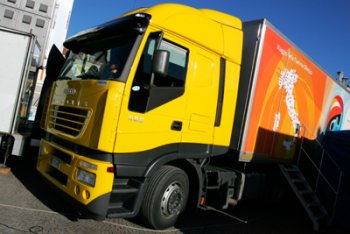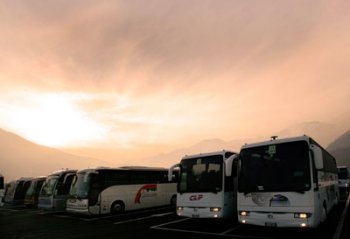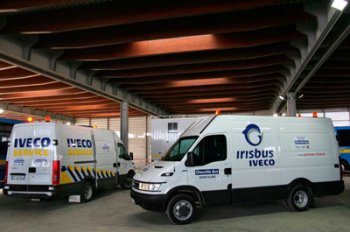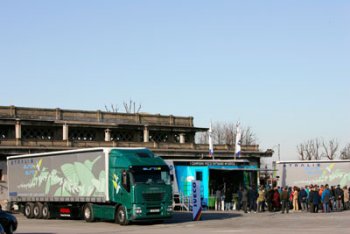|
To promote the
link between Iveco and the XX Olympic Winter Games which are
taking place in Turin this week, a “procession through
Italy” was organised, an initiative that involved a number
of leading vehicles from the Iveco range, which crossed the
Italian peninsula (Verona, Catanzaro, Bari, Napoli, L’Aquila,
Pescara, Perugia, Genova, Ragusa, Trento) for 7.500 km,
between November 2005 and February 2006, concluding their
journey just one week before the official opening of the
Games. “The Iveco Champions come into play” is the slogan
that accompanies Iveco’s involvement as an Official Sponsor
of the Torino 2006 XX Olympic Winter Games.
All the “passenger transport” services during the Olympic
Winter Games over the next two weeks, and then Paralympic
Winter Games, are being organised using Iveco Irisbus
vehicles. There is a huge fleet of around 1,200 buses,
mainly long distance and touring coaches, but also minibuses
and town buses, to transport the athletes, journalists,
spectators and staff volunteers. The Games’ other Sponsors
are also using over 100 Iveco Irisbus luxury touring coaches
to transport their own guests. What is more, vehicles from
the entire Iveco range have been employed in the
development, construction and outfitting of the structures
for the Torino 2006 Olympic sites. In addition, 26 Iveco
vehicles were also supplied to Coca Cola and Samsung, the
two sponsors of the “Olympic Torch Relay” and to the games
organisor's, Toroc.
The fleet of
over 1,200 buses being provided by Iveco to guarantee all
the passenger transport services during the Olympics are now
fully operational, the Daily Ecodriver included. The Daily
Ecodriver vehicles underline both Iveco’s sensitivity to the
protection of the environment and the fact that respect for
the environment is central to the Torino 2006 XX Winter
Olympics, as the setting for the competition and above all
because it is an important element to defend and promote.
|
 |
|
Iveco are providing a fleet of around 1,200 buses
for Torino 2006, mainly long distance and touring
coaches, but also minibuses and town buses, to
transport the athletes, journalists, spectators and
staff volunteers. |
|
 |
|
Iveco are providing a fleet of around 1,200 buses
for Torino 2006, mainly long distance and touring
coaches, but also minibuses and town buses, to
transport the athletes, journalists, spectators and
staff volunteers. |
|
|

 |
|
To promote the link between Iveco and the XX Olympic
Winter Games a 'procession through Italy' was
organised, an initiative that involved vehicles from
the Iveco range crossing the Italian peninsula. |
|
|
Meanwhile over the weekend two Daily Ecodriver vehicles
joined the large transport fleet operated by Gruppo Torinese
Trasporti (GTT), the company that runs public transport in
and around Turin. The Daily Ecodrivers, developed jointly
with Bosch, have joined approximately 200 vehicles running
on natural gas that Iveco has already supplied to GTT,
underlining both companies’ sensitivity to the protection of
the environment. This environmental awareness is an integal
part of Iveco’s corporate stategy, a fact underlined by the
company’s inclusion in the Torino 2006 Sponsor and
Sustainability programme, which aims to highlight the
environmental initiatives put in place by Games organisers'
TOROC and its partners, focusing on common elements and
strengths in the context of the Torino 2006 Olympic Winter
Games.
Research and development activities never cease at Iveco,
and this enables the company to offer its customers reliable
state-of-the-art solutions, which are always designed to
have a minimal impact on the environment. The Iveco Daily
Ecodriver is equipped with a parallel hybrid propulsion
system; this type of vehicle architecture keeps fuel
consumption to a minimum and also lowers the vehicle's
emissions considerably.
The vehicle is fitted with a 45 kW / 240 Nm electric
generator, combined with a 6as300 automated transmission and
an additional 400 V battery pack, which recovers and
releases energy. The vehicle’s main goal is to reduce
consumption and emissions (particularly CO2 and greenhouse
gases) in the urban environment, without detracting in
anyway from travelling comfort for passengers, performance
or versatility when used out of town, by recovering and
storing energy on the over-run and in other conditions, and
releasing it when starting, or accelerating sharply.
|
|
|
|
![]()
![]()